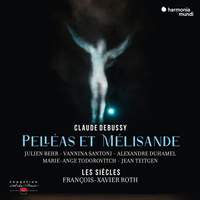Recording of the Week,
Pélleas et Mélisande from François-Xavier Roth and Les Siėcles
Ever since I heard what a difference the period instruments of Les Siėcles made to Debussy’s rich sound-world on their 2018 recording of Jeux and the Nocturnes I’ve been hoping that the orchestra and their conductor François-Xavier Roth might turn their collective hand to the composer’s only completed opera - and my high hopes were certainly not disappointed by the results, captured last summer during live-streamed performances from an empty Opéra de Lille.
 The metaphorical curtain has barely risen on Debussy’s uncanny forest before the special magic created by the use of early twentieth-century wind and brass instruments (the booklet has chapter-and-verse on dates and manufacturers) kicks in, the slightly rustic timbre of the double-reeds placing the scene clearly en plein air as well as emphasising the medieval setting, and the edgy quality of the horns heightening the sense of anxiety which percolates throughout this opening scene and indeed the opera as a whole. Pélleas is a work which hinges on contrasts between darkness and light, space and confinement, and those oppositions somehow register more keenly than ever thanks to the period instruments and Roth’s unfailingly astute responses to the colours they offer – the vaults of the castle have rarely sounded more moulderingly oppressive, the interludes of fresh air and sunlight more crisp and sparkling.
The metaphorical curtain has barely risen on Debussy’s uncanny forest before the special magic created by the use of early twentieth-century wind and brass instruments (the booklet has chapter-and-verse on dates and manufacturers) kicks in, the slightly rustic timbre of the double-reeds placing the scene clearly en plein air as well as emphasising the medieval setting, and the edgy quality of the horns heightening the sense of anxiety which percolates throughout this opening scene and indeed the opera as a whole. Pélleas is a work which hinges on contrasts between darkness and light, space and confinement, and those oppositions somehow register more keenly than ever thanks to the period instruments and Roth’s unfailingly astute responses to the colours they offer – the vaults of the castle have rarely sounded more moulderingly oppressive, the interludes of fresh air and sunlight more crisp and sparkling.
The other striking aspect of this recording is the slightly unorthodox characterisation of the three main roles, and the new light which it throws upon the doomed love-triangle at the heart of the piece – this is a very human Pélleas rather than an interpretation which cloaks the central relationships in mysticism, and though some listeners may baulk at that as tantamount to heresy I found it ultimately all the more moving.
 Vannina Santoni’s Mélisande is the key to all this, and hers is the performance which is most likely to polarise devotees of earlier recordings. With roles like Violetta, Manon and Donna Anna in her repertoire, Santoni’s is a rather more substantial voice than we often hear in this opera, and right from her opening ‘hands off!’ injunction to Golaud she’s earthier and more assertive than many of her predecessors on disc and on stage: this is no ethereal wood-sprite with complex intimacy issues, just a flesh-and-blood woman on her guard against a stranger getting too close for comfort.
Vannina Santoni’s Mélisande is the key to all this, and hers is the performance which is most likely to polarise devotees of earlier recordings. With roles like Violetta, Manon and Donna Anna in her repertoire, Santoni’s is a rather more substantial voice than we often hear in this opera, and right from her opening ‘hands off!’ injunction to Golaud she’s earthier and more assertive than many of her predecessors on disc and on stage: this is no ethereal wood-sprite with complex intimacy issues, just a flesh-and-blood woman on her guard against a stranger getting too close for comfort.
And that refreshingly prosaic quality continues (to my ears) to pay dividends throughout the opera. Mélisande’s malaise and her inability to articulate it to her husband seems to be caused by ‘no other but the main’: her isolation in a gloomy, morbid environment and her terminal lack of rapport with the man she’s been coerced into marrying. Likewise, there’s little in tenor Julien Behr’s characterisation of Pélleas to support Golaud’s assertion that his half-brother is ‘un peu étrange’ – his eloquence and ardour certainly suggest a richer inner life than his sibling can fully comprehend, but there’s none of that other-worldly, near-dysfunctional reticence which Christian Gerhaher brought to the role for Simon Rattle a couple of years ago. (Perhaps that heightened emotional articulacy is partly down to the fact that this entire cast is Francophone – the slight cautiousness which non-native speakers often harness to fine effect in the title-roles is replaced here by an easy fluency which sheds a different light on their bond).
Alexandre Duhamel’s Golaud, too, comes across as a simpler (and in the early stages more sympathetic) man than Gerald Finley for Rattle, bluff and awkward rather than self-important in his opening encounter with Mélisande, and showing genuine warmth towards his young son Yniold before their conversation in Act Four takes an ugly turn – one feels that the relationship between these two was a close one before Golaud was unhinged by bereavement and jealousy. Boy soprano Hadrien Joubert is terrific in this pivotal scene: that his sound is a little less polished than Elias Mädler for Rattle only underlines his terror as his father forces him to spy on the lovers, and his bathetic answers to his father’s cross-examination generate a dark humour that intensifies the horror that’s to come.
Vocally and orchestrally, then, there are revelations aplenty here – seasoned Pélleas-philes will hear the work in a different light, whilst newcomers could scarcely do better.
Julien Behr (Pelléas), Vannina Santoni (Mélisande), Alexandre Duhamel (Golaud), Marie-Ange Todorovitch (Geneviève), Jean Teitgen (Arkel), Hadrien Joubert (Yniold)
Les Siècles, Chœur de l'Opéra de Lille François-Xavier Roth
Available Formats: 3 CDs, MP3, FLAC, Hi-Res FLAC



